Possibly the first-ever PC game entirely about The Spanish American wars of independence?
Type: Singleplayer, Multiplayer
Genre: Strategy
Developer: Headquarter S.L.
Publisher: Avalon Digital
Release date: 12 Jun, 2020


The Spanish American wars of independence were a series of wars where the Spanish colonies of the Americas fought for more independence from the Spanish crown. It was a messy period, where people fought against Spain for different reasons, while Spain desperately tried to hold on to their colonies. These wars ultimately lead to the colonies gaining independence and forming their own nations, some of which still exists today.
Libertad o Muerte! is a moderately light wargame that tackles this turbulent time in American history. And turbulent is a pretty apt description of this game as well. With rebel forces popping up everywhere, and Spain having the ability to ship troops from their home territory to almost anywhere, this is a very chaotic wargame.
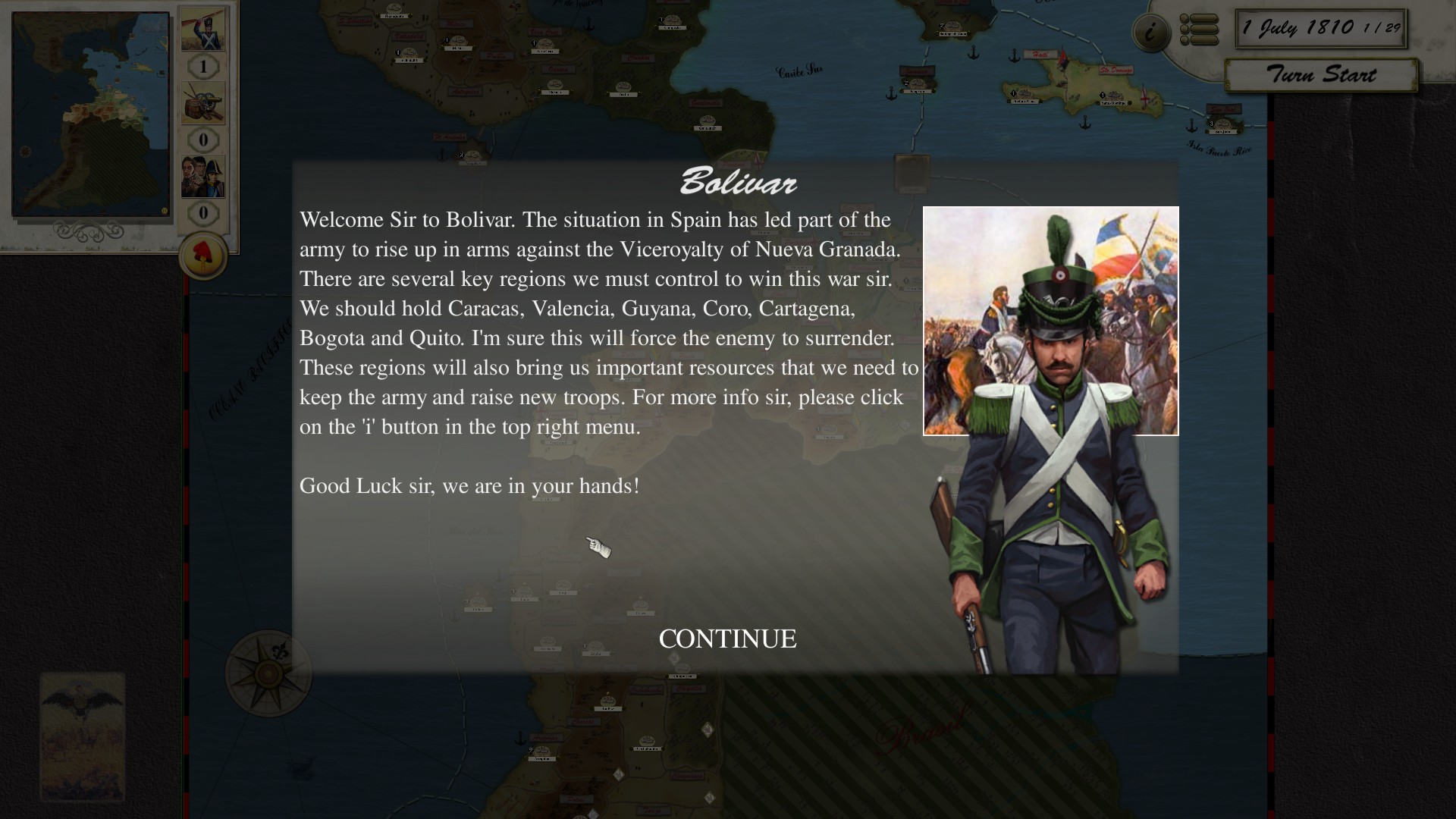
Story & Setting
With Spain weakened after France’s invasion in 1807 voices were starting to be heard in the American colonies. Voice that demanded more independence from the crown. These ranged from a bit more freedom for the colonies to govern themselves, to complete independence from Spain. When Spain rejected these demands, armed uprisings started happening, regions declared independence and pretty soon almost all the colonies tried to break free.
The result of these wars was that almost all of the Spanish Americas were able to gain independence from Spain, with only a few Caribbean islands still being under Spanish rule, the largest of which was Cuba.
This is, of course, a gross oversimplification of a very complex situation, but the complexity of the Spanish American wars of Independence makes it hard to sum things up in a brief way. And the exact details of what lead up to the wars is still not entirely clear, with historians not having been able to agree on a single set of reasons.
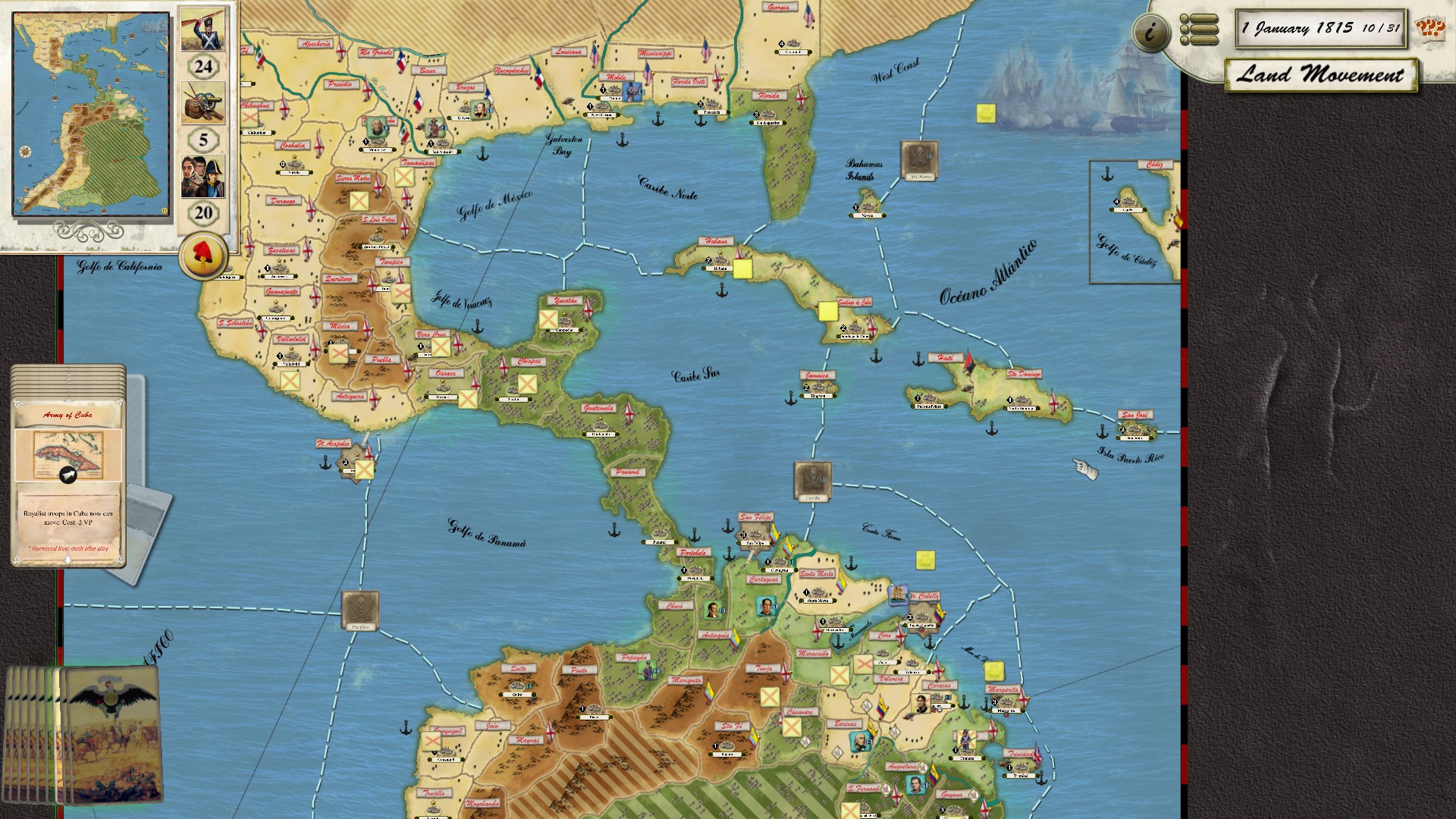
Graphics & Sound
Much like the developer’s previous game, Battles for Spain, Libertad o Muerte! looks and feels like it could be a board game. You have a map that’s split into separate zones, with simple, yet not unappealing art, that could very well have been printed on a piece of cardboard and used for a tabletop game. Units are represented by small square-shaped counters with art on them, and numbers to represent their stats.
The games sound effects are perfectly fine, if a bit loud at times. When you move units, play cards and click on things, you get a sound effect that serves to give feedback, and when they’re not too loud, they do a good job at it. And as for the music, it fits with the theme and sounds quite bombastic.
One thing that the game does less well is font choice though. You’ll sometimes get historical events (tied to specific cards), that comes with a bit of backstory, and the font is nigh unreadable. Most text that’s actually important to the game is in an easier to read font though, but location names on the map are also in this hard to read font.
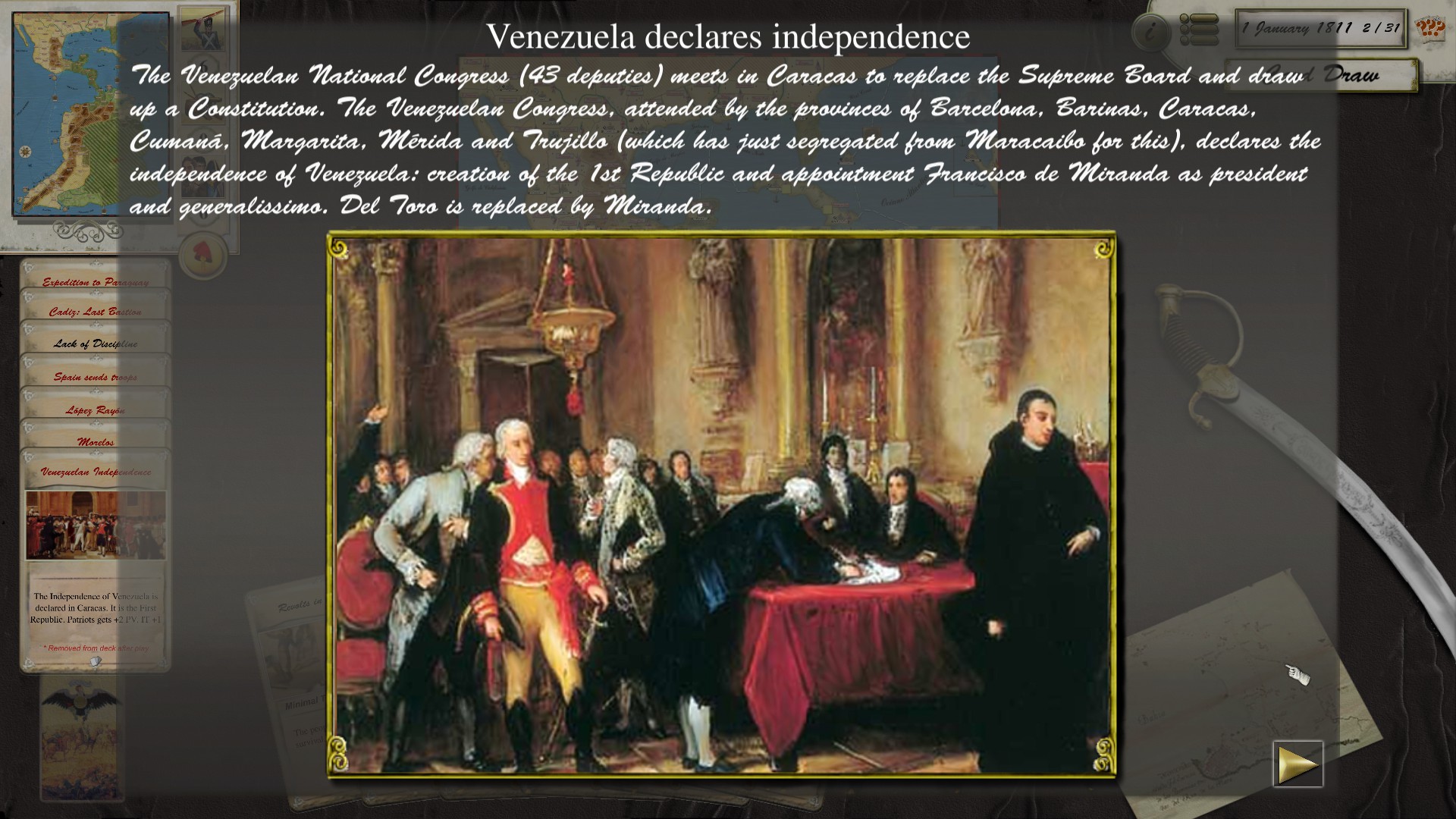
Gameplay
Libertad o Muerte! is a light wargame that uses a ruleset similar to Battles for Spain or the Winter War. It uses dice to determine the outcome of battles, and cards are used to add a bit of unpredictability, as they’ll be used to generate a special event or give one side or another a bonus in combat.
The game is split up into distinct phases, like drawing cards, moving naval units, moving troops and so on, and much like for the other games using this rule system, it makes it quite easy to keep track of everything. Even though the map is quite big, if you play one of the scenarios that deal with the wars in their entirety, it’s easy to remember to move all your units and do everything you need to do, because of how the turn is split up into smaller pieces.
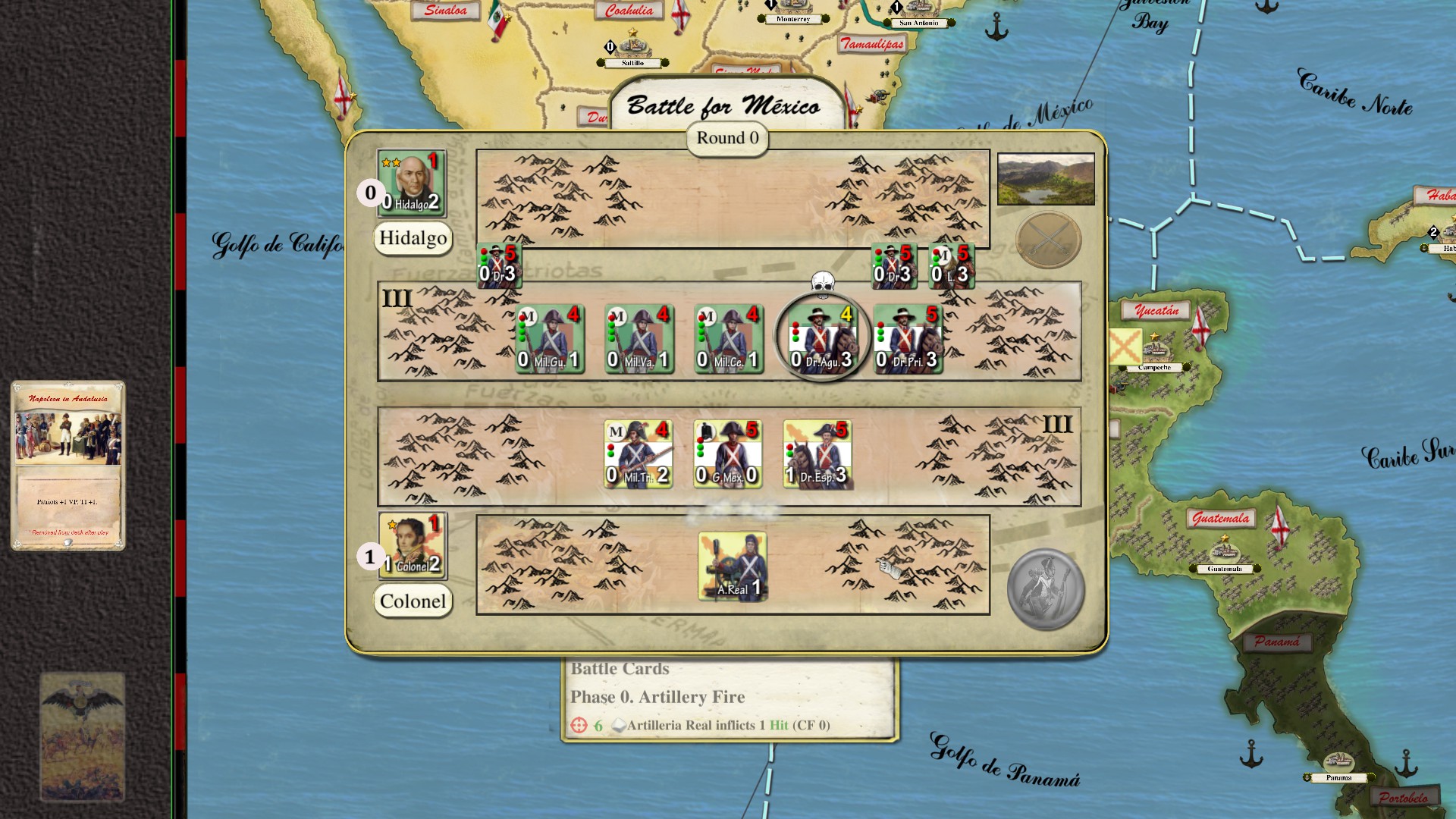
There are, in the game, two sides to the conflict, the rebels (or patriots as they’re known in-game) and the royalists. These two sides follow the same rules, but the way the decks of cards work for both sides do make them play distinctly different. The royalists start with most of the map under their control and tend to be able to call in higher quality troops from Spain itself, while the patriots have rebel armies popping up all over the place, even in areas that previously seemed secure. This can make things feel a bit random, particularly if you play as the Royalists, but it also does a good job at making the wars feel chaotic. As random as it might feel, there’s also a good bit of strategy to this, more so as the patriots, as you can choose when the rebel armies show up, as it’s done by playing cards. So you can make sure that the armies pop up when and where they can cause the most damage.
The cards are what gives this game most of its flavour, and they serve a more integral part to the game than those of Battles for Spain. The rest of the game is quite straight forward though. You move troops by dragging and dropping them into areas, and if units from different sides end up in the same area, they fight. Some units are limited to their own home region, so you’ll for an example have units that won’t leave the area in and around Chile, while others are free to move more as they please. Ships also add more freedom to how troops can move, as they are generally faster, and thus you can transport troops from one end of the map to another, giving you more strategic mobility.
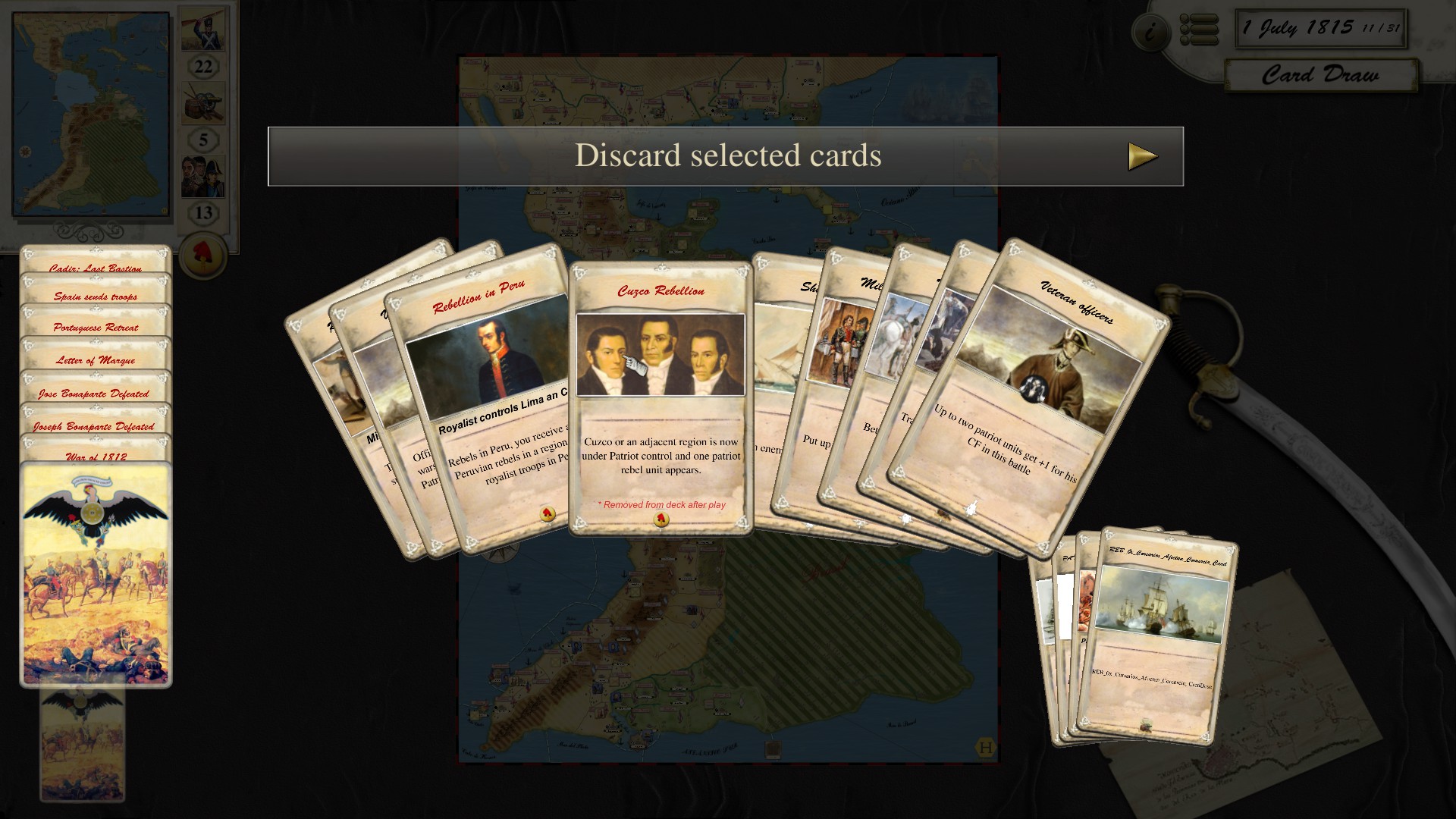
Once combat starts, the only impact you have on it is if you want to play some cards that can influence it, and as the attacker, if you want to flee after a combat round. Otherwise, your units will just take a turn, attacking each other, with better units having a better chance of dealing damage to the enemy. If a units HP is reduced to 0, it dies permanently, but the damage is not removed between battles, and instead, you need to spend resources on removing damage from units.
Every second turn you get the chance to heal your units and recruit new ones. This costs resources, but preventing units from dying is important, as you’re recruiting from a limited pool of units (one that can be grown with cards). But be careful with recruiting too many units, because if you can’t pay for their upkeep, you’ll end up losing them.
If there are any major flaws with this game, it’s the lack of a proper tutorial. You get a rulebook with the game, which will give you all the information you need to understand all the mechanics, but a tutorial would be good for making it easier to pick up and play. That said, this is not an overly complex game, and you don’t need to know exactly how all the mechanics work to make informed decisions, but the game would still benefit greatly from a good tutorial. Combat can also be a bit on the slow side, with it taking too long between each attack.
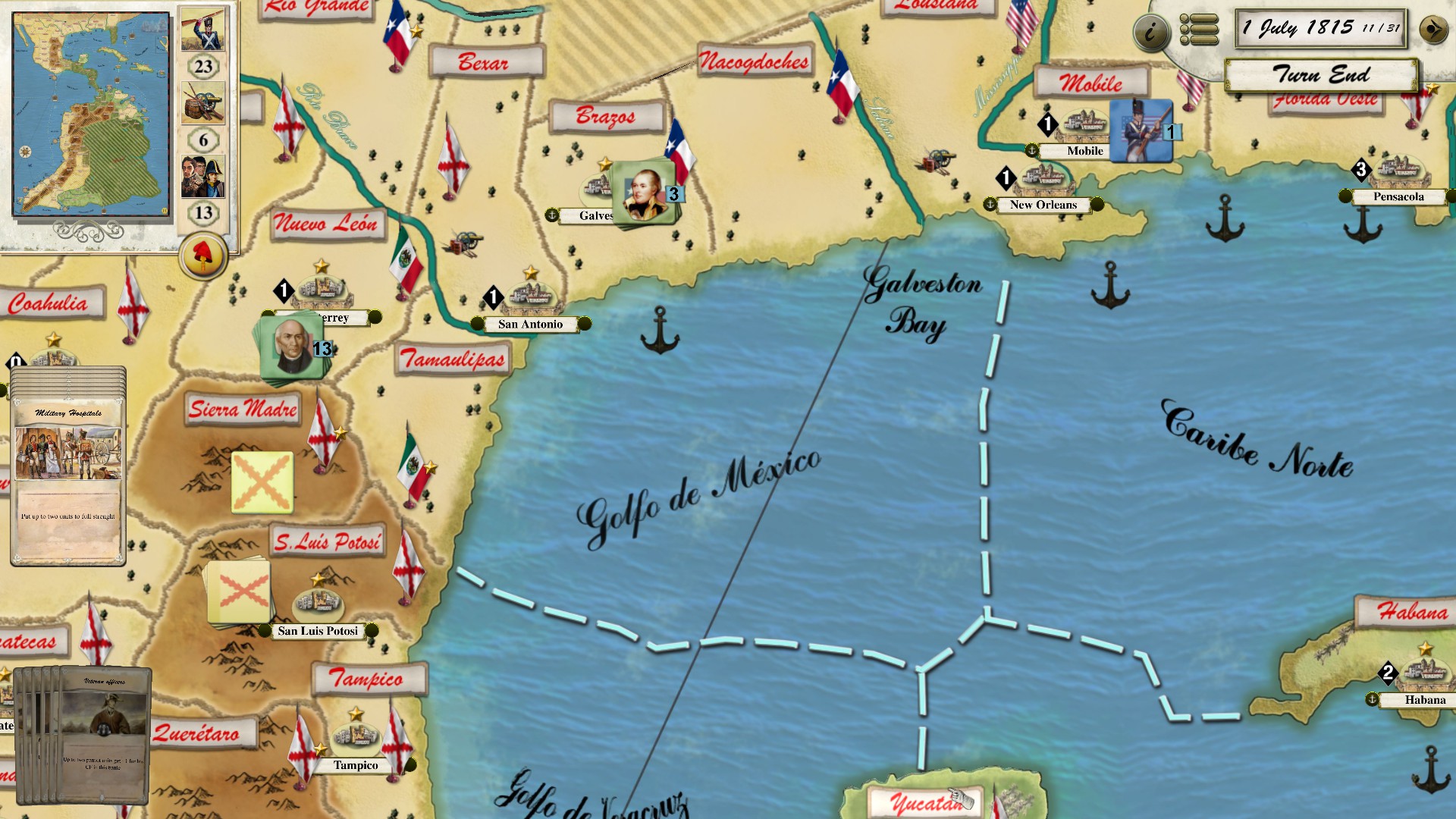
Closing Thoughts
Libertad o Muerte! is based on a conflict that I’ve never seen represented in a game before, and that in itself earns it a few bonus points in my book, and the fact that it’s quite accessible and easy to pick up and play does not hurt it either.
While this game might not be as complex, or deep, as something like Revolution under Siege by AGEOD, it never really tries to be that, this is a light wargame, that has a simple yet functional rule system, and the developers have done a good job at representing the chaos of the conflict. And most importantly, it’s a fun game. There are a few rough edges that could be ironed out, and I hope that the developer adds a good tutorial in their next game, but overall, this is a really good game, and I feel like it’s an improvement on the developer’s last game, Battles for Spain (which I did enjoy).











Thanks for the review, considering it’s purchase on release and your review would be a major part of my decision process.